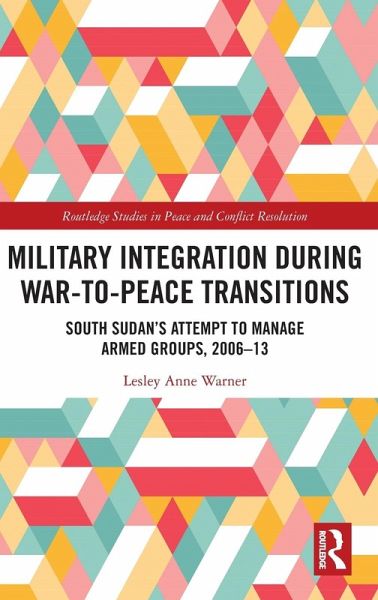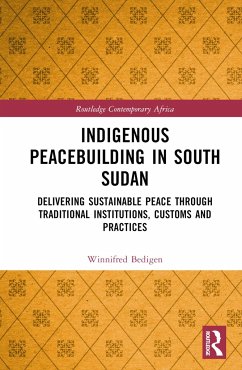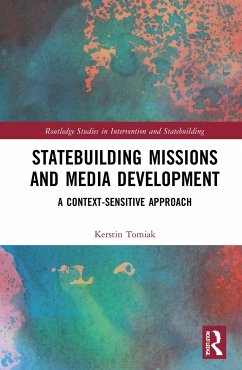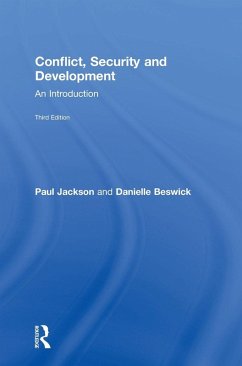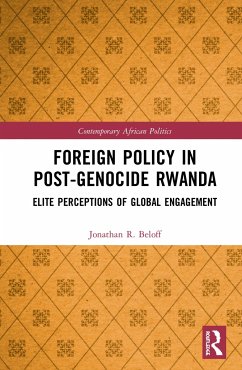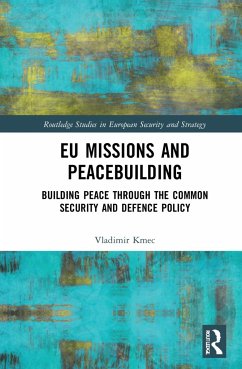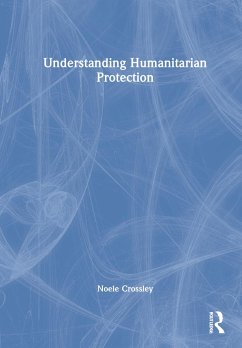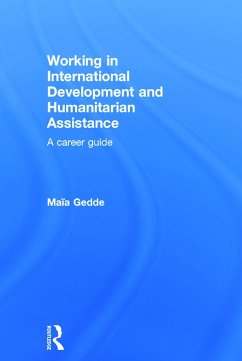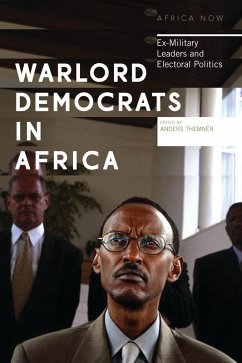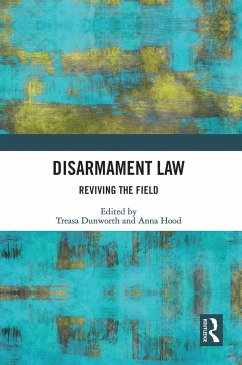Lesley Anne Warner
Gebundenes Buch
Military Integration during War-to-Peace Transitions
South Sudan's Attempt to Manage Armed Groups, 2006-13
Versandkostenfrei!
Versandfertig in 1-2 Wochen
Weitere Ausgaben:

PAYBACK Punkte
86 °P sammeln!





This book explores why countries undergoing transitions from war to peace decide to integrate armed groups into a statutory security framework, with a focus on the case of South Sudan.
Lesley Anne Warner is a foreign affairs analyst based in Washington, D.C. specializing in U.S.-Africa policy. She holds a PhD in War Studies from King's College London and a MA in Security Studies from Georgetown University. Dr. Warner has worked at the State Department, the Foreign Affairs Committee in the U.S. House of Representatives, National Defense University, and the RAND Corporation.
Produktdetails
- Verlag: Routledge
- Seitenzahl: 174
- Erscheinungstermin: 7. Juni 2023
- Englisch
- Abmessung: 240mm x 161mm x 14mm
- Gewicht: 432g
- ISBN-13: 9781032112282
- ISBN-10: 103211228X
- Artikelnr.: 67515892
Herstellerkennzeichnung
Libri GmbH
Europaallee 1
36244 Bad Hersfeld
gpsr@libri.de
'Painstakingly compiled with immense insights of an account so complex trying to address a phenomenon that has been always besetting state building efforts in South Sudan. The trap of armed groups integration has been the epicentre of the state failure and of the crises that have bedevilled the young state's transition. The bloated security sector has remained shockingly at wedge with the economy's carrying capacity. The difficult civil-military relations framework which it has engendered - have been a huge drag on democracy and human rights.Lesley-Anne Warner's analysis doesn't only take of cognizance of what government officials should prioritize at the early stage of state formation. Rather, it also takes vigilance of generalizable
Mehr anzeigen
patterns which are required to frame an effective model for state building.'
Dr. Majak D'Agoôt, Senior Research Associate, King's College London, former Sudan's Deputy Chief of Intelligence and South Sudan's Defence Minister, UK
'Lesley Anne Warner has produced a crucial analysis of military integration in the context of South Sudan. Based on extensive field work, her account of decisions made and dilemmas encountered adds invaluable insight to both practitioners and academics engaged with peacebuilding. Specifically, this book demonstrates superbly the ongoing security and political challenges that face countries emerging from war and the difficult trade-offs inherent to this "post-conflict" moment.'
David Ucko, Professor, National Defense University, USA
'The process of state formation is exceedingly complex, daunting, and prone to failure for a multitude of reasons. And yet the consolidation of states capable of providing the public goods required for modern life remains the epic task of the 21stcentury. Dr. Warner's book provides insight into the stark choices facing the Government of South Sudan in its attempts to mitigate the threats to stability of diverse and disparate armed groups; fight them, ignore them, or accommodate them. She shows how even the "least bad" choice-accommodation-comes with inherent risks that may result in long-term instability, and how combatants and ex-combatants exercise their own agency while the United Nations and other external agents try to manage the process. The book is not just about South Sudan; it is a primer for leaders of any country-or well-meaning outsiders-seeking to achieve stability and enduring peace.'
Michael Miklaucic, INSS Senior Fellow, PRISM Editor-in-Chief, National Defense University, USA
'This book is a meticulous rendering of the story of South Sudan's struggles with security sector development after it became independent in 2011. This is a significant contribution to the understanding of the intersection of war, peace, stability and professionalization of a national army. It will be of great interest to social scientists, historians and security professionals.'
Jok Madut Jok, Professor of Anthropology at Syracuse University, USA
Dr. Majak D'Agoôt, Senior Research Associate, King's College London, former Sudan's Deputy Chief of Intelligence and South Sudan's Defence Minister, UK
'Lesley Anne Warner has produced a crucial analysis of military integration in the context of South Sudan. Based on extensive field work, her account of decisions made and dilemmas encountered adds invaluable insight to both practitioners and academics engaged with peacebuilding. Specifically, this book demonstrates superbly the ongoing security and political challenges that face countries emerging from war and the difficult trade-offs inherent to this "post-conflict" moment.'
David Ucko, Professor, National Defense University, USA
'The process of state formation is exceedingly complex, daunting, and prone to failure for a multitude of reasons. And yet the consolidation of states capable of providing the public goods required for modern life remains the epic task of the 21stcentury. Dr. Warner's book provides insight into the stark choices facing the Government of South Sudan in its attempts to mitigate the threats to stability of diverse and disparate armed groups; fight them, ignore them, or accommodate them. She shows how even the "least bad" choice-accommodation-comes with inherent risks that may result in long-term instability, and how combatants and ex-combatants exercise their own agency while the United Nations and other external agents try to manage the process. The book is not just about South Sudan; it is a primer for leaders of any country-or well-meaning outsiders-seeking to achieve stability and enduring peace.'
Michael Miklaucic, INSS Senior Fellow, PRISM Editor-in-Chief, National Defense University, USA
'This book is a meticulous rendering of the story of South Sudan's struggles with security sector development after it became independent in 2011. This is a significant contribution to the understanding of the intersection of war, peace, stability and professionalization of a national army. It will be of great interest to social scientists, historians and security professionals.'
Jok Madut Jok, Professor of Anthropology at Syracuse University, USA
Schließen
Für dieses Produkt wurde noch keine Bewertung abgegeben. Wir würden uns sehr freuen, wenn du die erste Bewertung schreibst!
Eine Bewertung schreiben
Eine Bewertung schreiben
Andere Kunden interessierten sich für




